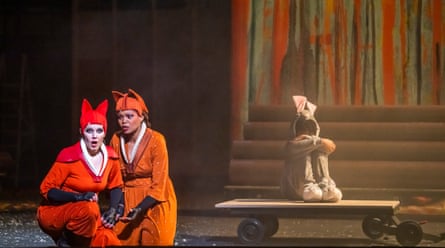No winged fairies populate the pulsating darkness of Scottish Opera’s new A Midsummer Night’s Dream. These sprites are woolly-wigged ragamuffins, a devious bunch who inhabit the crevices of Duke Theseus’s mirrored palace like beady brown woodlice. Night is a time of alarm and subversion, which is as it should be: Britten’s 1960 opera, in every fantastical and textured detail, from tap-tapping harpsichord to belching trombone, speaks of churning mystery.
Directed by Dominic Hill (artistic director of Glasgow’s Citizens theatre) and conducted by Scottish Opera’s music director, Stuart Stratford, this is a bewitching staging of high theatricality, ending with big-hearted, over-the-top hilarity. The wolf whistles and cheers at the final curtain suggest the company has a hit on its hands.
Anti-pastoral but murkily beautiful, the look in Tom Piper’s designs (lighting by Lizzie Powell) is last century retro doused in messy gothic. Unmade beds hang from the ceiling. Tytania, sung by Scottish Opera’s talented emerging artist, coloratura soprano Catriona Hewitson, has a touch of the Helena Bonham Carter in her silvered, vintage hair and gown. Making his Scottish opera debut, the American countertenor Lawrence Zazzo, striking as the ethereal, almost disembodied Oberon, is pale-faced, purple-lipped, ghoulish. A punk Puck (Michael Guest), blessed with limbs that bend in all directions, manages the remarkable feat for this spoken role, of prompting delight rather than irritation.
Consisting of many roles and a children’s chorus (gutsy and excellent here), Britten’s opera is ideal for introducing new voices. Jonathan McGovern’s Demetrius, Charlie Drummond’s Helena, Lea Shaw’s Hermia and Elgan Llŷr Thomas’s Lysander – all singers to watch – found maximum character in the quartet of lovers. Glen Cunningham as Francis Flute, tottering in high heels, let rip in his limelight moment as Thisbe, high comedy, well handled. His co-Rustics, led by David Shipley as the winningly bumptious weaver Nick Bottom made merry in their last act entertainment, to much audience laughter. You can forgive the work’s longueurs at the start – Britten and his partner, Peter Pears, made their own libretto from Shakespeare, hastily – given the dazzling musical ingenuity of the finale. The orchestra of Scottish Opera and Stratford, the company’s music director, deserved their extra-loud applause.
Pastoral came in a double dose last week. Janáček called his 1924 opera The Cunning Little Vixen a “forest idyll” that would awaken our sense of the unity of life and nature. English National Opera’s new staging, conducted by Martyn Brabbins, directed by Jamie Manton in his first main-stage production, have honoured the work with a lively cast, a degree of chaos and minimal sentimentality. Small insects hurtle in on kick scooters. Frog, cricket, dragonfly variously flit and croak. Jolly hens wear frilly white frocks and yellow plastic shoes. They cheer the staging, but it errs too far on the side of drab. Any idyll is in the music alone.

When, in the last act, the poacher (a notable Ossian Huskinson) shoots dead his foxy prey, this endlessly bubbling, twittering and boiling score abruptly stops. Soft woodwind curls up out of the silence until the full orchestra unfolds, timpani thudding out a funereal beat. This is the moment the work takes an emotional grip, speaking as one who has not got the gene to find “singing animals” automatically alluring. In Tom Scutt’s stripped-down set a narrow screen rolls down to indicate seasons, sunrise, sunset. Eventually the black line drawings of twigs and birds shift into an abstraction of notes and staves, reflecting the works touching orchestral close.
Brabbins and the ENO Orchestra catch Janáček’s mix of angular and folk-inspired idiom, the performance well-paced but not breathless. Vixen Sharp Ears, of the title, sung by Sally Matthews with bright energy, finds love with the warm-voiced, alluring Fox of Pumeza Matshikiza, in her house debut. As their offspring, children of two Westminster primary schools sang their hearts out, engaging wholeheartedly with the ENO Chorus. Lester Lynch’s sympathetic Forester had powerful stage presence. Alan Oke and Clive Bayley, as schoolmaster and priest, compete for the title of most droll, leading a classy lineup of cameos.
The Bath BachFest, like many small festivals dealing with pandemic shutdowns, has adapted and now streams live events, reaching a wider audience. The final concert, given at the Assembly Rooms by the Academy of Ancient Music, featured two Bach suites, No 2 in B minor and No 3 in D major. The flautist Rachel Brown gave a short, spirited discourse on 18th-century dance forms. Bach united the traditions of different countries through minuet, sarabande, polonaise. In a critical week for Europe, this was a sobering thought.
Star ratings (out of five)
A Midsummer Night’s Dream ★★★★
The Cunning Little Vixen ★★★
Bath BachFest ★★★★
A Midsummer Night’s Dream is at the Festival theatre, Edinburgh, 1-5 March
The Cunning Little Vixen is at the Coliseum, London, until 1 March

Comments (…)
Sign in or create your Guardian account to join the discussion